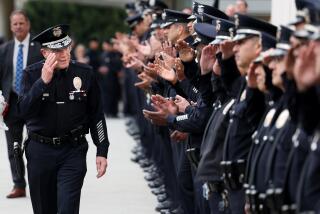LAPD: Getting to ‘Yes’
- Share via
Because the bargaining is being conducted in secret, only some of the demands that Justice Department officials are pressing with city officials in the ongoing Los Angeles police corruption scandal are known. Every one that is known, however, seems reasonable and necessary. Police Chief Bernard C. Parks has already lobbied for one of the changes, and the Police Department already has received funding for another. Kelly Martin, the mayor’s chief of staff, claims “there are no per se deal-killers.” So what’s the problem?
The Justice Department, according to Times reports, wants a computerized tracking system that would help ferret out problem officers before they go thoroughly bad. That’s a 9-year-old goal from the Christopher Commission report on police reform, one for which the LAPD allowed federal funding to languish.
Justice officials also want a beefed-up internal affairs division, and they want it to handle more investigations into alleged police misconduct. Right now, local police supervisors carry out too many such investigations, with dubious results. Parks has lobbied for a substantial increase in the LAPD’s internal affairs division.
The most contentious demand is for a federal monitor, a position that has been shrouded in misinformation. Opposition has come from Parks, LAPD supporters, mayoral hopefuls and others. They say it’s unnecessary; that you cannot cede local control of the Police Department; that it would create a new level of bureaucracy, sapping LAPD resources and removing cops from the streets.
The truth is, an outside monitor is badly needed. If the LAPD had embraced all of the Christopher reforms in 1991, the department might be in a far different position today. Important goals, like a bona fide police tracking system, were not met.
Federal monitors would not move in and take over the LAPD’s purse strings or day-to-day operations. A review of major cases around the nation involving federal monitors over the last three years clearly shows that what they do is monitor. Most often, they visit a few times a year to determine whether a city and its police department are carrying out the terms they have agreed to. Usually, after five years, a city can argue that monitoring is no longer needed.
Local officials wind up ceding a measure of control to a federal judge only if they fail to meet the terms of a consent decree, and then only to the extent that it takes to meet the particular goal. For example, if Los Angeles again would fail to develop a reliable tracking system, it might be ordered to place that system at the top of its spending list.
It can be argued that ongoing oversight of the Los Angeles County Sheriff’s Department by special counsel Merrick Bobb helped keep that department on the path to reform and paved the way for Sheriff Lee Baca’s call for more civilian involvement in internal investigations.
Expanded authority for the Los Angeles Police Commission’s inspector general is another federal demand that is reasonable but has been strongly opposed by Chief Parks. This is not a situation in which an official might be given too much power and too much ability to troll for abuses at great public expense. The LAPD inspector general, currently Jeffrey Eglash, lacks the most basic powers granted to such positions elsewhere, including the ability to offer confidentiality to those who come forward with information. One former federal inspector general calls Eglash’s authority laughably inadequate.
If the Justice Department has demands that are excessive, we haven’t heard them. That’s part of the problem with the closed-door negotiations between federal and city officials. Angelenos would be better served if both sides publicly showed all their cards.
What we have heard are demands that, if met, will take the LAPD a long way toward real reform. Also, it would be sensible for the city to agree to those terms and thereby avoid a long and costly fight against a federal lawsuit in the courts.
More to Read
Sign up for Essential California
The most important California stories and recommendations in your inbox every morning.
You may occasionally receive promotional content from the Los Angeles Times.










